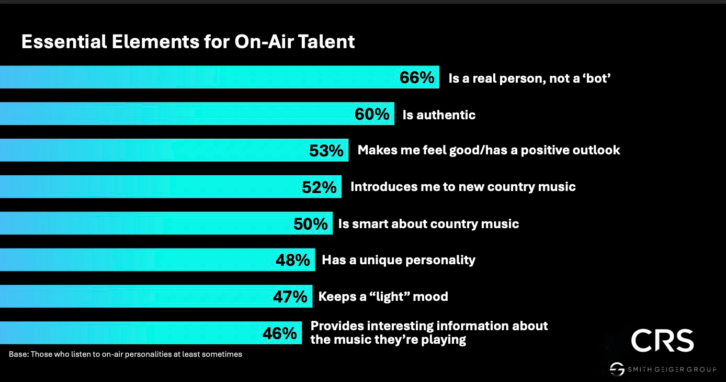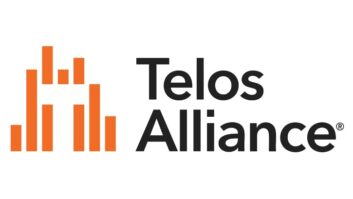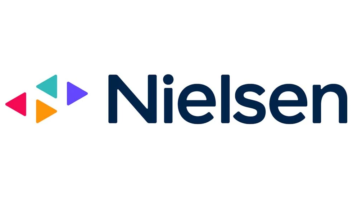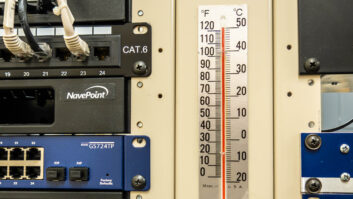Radio World’s “Guest Commentaries” section provides a platform for industry thought leaders and other readers to share their perspective on radio news, technological trends and more. If you’d like to contribute a commentary, or reply to an already published piece, send a submission to radioworld@futurenet.com.
The author is founder of Ordo Digital. He will speak at the NAB Show in two sessions related to artificial intelligence, “Using AI as a Creative Content Tool” on Sunday afternoon and “AI Strategies for Sales, Marketing and Operations” on Tuesday morning.
As artificial intelligence continues making inroads into various industries, radio broadcasters have been contemplating if and how AI voices and DJs may supplement or even replace human talent. However, a new survey of more than 800 Americans by SmithGeiger Group indicates that radio listeners value authenticity and human connection from radio personalities over AI-generated voices. The survey results were presented at the 2024 Country Radio Seminar.

A Platform of personalities
The numbers reveal radio is still very much powered by personalities. A full 86% of respondents prefer radio hosts who “feel authentic,” rather than perfectly polished. Additionally, 73% favor DJs who go beyond just introducing songs to “share stories” and insights that bring deeper meaning to the music. And 68% like on-air talent to use a casual, relatable “everyman” communication style reminiscent of speaking with a friend, rather than a distant celebrity.
“The most successful influencers are themselves — they’re real,” said Andrew Finlayson, executive vice president of digital strategies at SmithGeiger. Finlayson presented the research at CRS.
“In a world that is going to be filled with AI content, this is an opportunity for radio,” Finlayson said. “This is a chance to connect with the audience.”
Perhaps most telling is that 47%, nearly half of those surveyed, had an outright distaste for AI radio voices, rating the concept poorly, or even hating it.
Escape through connection

Interestingly, the survey also suggested most listeners don’t want radio personalities espousing their political views (12%) or discussing international news (13%). What they desire is an escape from increasing complexity, anxiety and polarization in society. A commanding 90% of the country music fans surveyed said that it’s important for a radio personality to “keep a light mood.”
As Finlayson observed, “Escape factor is a big part of what you guys can do for the audience going forward. If you sit down at the end of the day and say, ‘I help my audience escape all the worries and fears that they have in a complex and sometimes scary world,’ you’ll have done your job.”
While AI promises efficiency and utility, only human beings can empathize with listeners, understand the role radio plays in their lives, and nurture that special relationship with the audience. Based on the survey results, broadcasters need to find the right balance between human personalities who authentically engage audiences and the latest tech innovations.
AI’s future in radio
At its essence, radio has always transcended mere entertainment. Unlike streaming playlists and algorithms, voices behind the mic provide community, wisdom and authentic comfort amid life’s chaos. By boldly leveraging real human voices, stories and connections, broadcasters can foster a relationship rooted in trust. One that AI simply cannot replicate.
In a follow-up phone call, Finlayson added, “Artificial intelligence can imitate human qualities, but it can’t be authentic. An AI can’t remember going to a concert.”
But radio broadcasters shouldn’t ignore practical opportunities for AI either. Stations may find success using AI voices for utility work, like promos, or producing weather reports.
“Hyper-local and hyper-personalization is beyond what a human can do on a daily basis,” Finlayson said. “But AI can help scale those efforts for broadcasters.”
Though AI voices may yet find useful applications in radio, the CRS study results suggest that putting more focus on fostering human connections on the airwaves is what radio listeners truly want.
For an industry facing AI disruption, that insight might just give some broadcasters a much-needed edge in their markets. But finding the right balance between how AI voices can be successfully used on-air without losing the audience still remains to be seen.
Key research takeaways from the CRS/SmithGeiger study:
- 86% prefer authentic DJs over perfectly polished talent
- 73% want DJs that share personal stories about the music
- 68% prefer a casual, relatable communication style
- 47% dislike the concept of AI radio voices
- Personalities that help audiences escape complexity have lasting value






